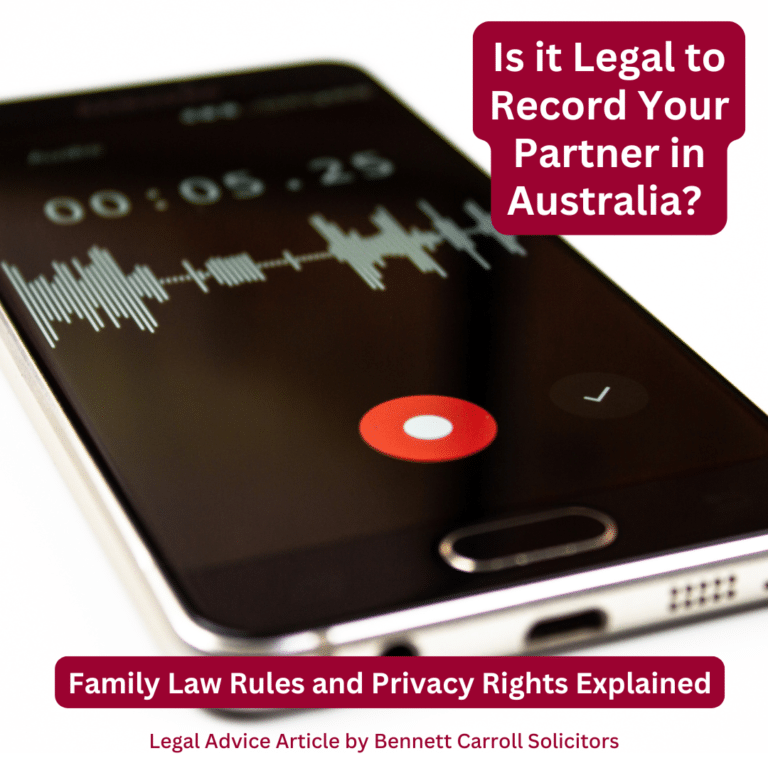Recording conversations with a partner in Australia, particularly during a relationship breakdown or family law matter, can seem like a reasonable way to protect yourself. However, understanding the legal ramifications of recording without consent in Australia is crucial. This article covers whether it’s legal to record your partner, Australian family law rules, and the implications of using such recordings in court.
The Law on Recording Conversations in Australia
In Australia, laws about recording conversations vary from state to state, but they generally fall under the broader category of “surveillance laws.” These laws regulate how and when you can record private conversations or activities, and they emphasize privacy protections.
In most Australian states and territories, it is illegal to record a private conversation without the consent of all parties involved. This is commonly referred to as “two-party consent.”
The relevant legislation includes:
– New South Wales: Surveillance Devices Act 2007 (NSW)
– Victoria: Surveillance Devices Act 1999 (Vic)
– Queensland: Invasion of Privacy Act 1971 (Qld)
– Western Australia: Surveillance Devices Act 1998 (WA)
– South Australia: Listening and Surveillance Devices Act 1972 (SA)
– Tasmania: Listening Devices Act 1991 (Tas)
– Australian Capital Territory: Listening Devices Act 1992 (ACT)
– Northern Territory: Surveillance Devices Act 2007 (NT)
Under these laws, recording a conversation without the other person’s knowledge or consent is generally prohibited unless an exception applies, such as when you have a reasonable belief that it is necessary to protect your lawful interests.
Exceptions: Protecting Your Lawful Interests
One of the key exceptions to these laws is the “lawful interest” exception. In some jurisdictions, you may be able to record a conversation if you reasonably believe that it is necessary to protect your lawful interests. For example, if you are concerned about your safety or need evidence of abusive behaviour for use in legal proceedings, this exception might apply.
However, this exception is not straightforward, and courts interpret it narrowly. The risk is that if you record your partner without their consent, and the court does not find that you were protecting your lawful interests, you could face legal consequences, including fines or even criminal charges.
Can These Recordings Be Used in Court?
Even if you have recorded a conversation with your partner, using that recording as evidence in a family law case is not guaranteed. Courts in Australia have discretion when it comes to admitting illegally obtained evidence. In family law proceedings, the court may consider whether admitting the recording is in the interests of justice, and whether the evidence is relevant to the case.
For example, if the recording captures clear evidence of family violence, the court may admit it despite its illegal nature, particularly if it is crucial to ensuring the safety and well-being of a child. However, there is no certainty, and each case is assessed on its specific circumstances.
Recording Conversations with Children
Recording conversations between a child and a parent can be even more legally complex. Courts are often concerned with protecting the child’s best interests, and covert recordings can be seen as damaging or manipulative. Additionally, recording your child’s conversations without consent can harm your case in family law proceedings if the court views it as an attempt to influence the child’s behaviour or testimony.
If you believe a recording of your child speaking with your partner could be essential to your case, it is best to seek legal advice before proceeding.
Alternatives to Recording
If you are in a situation where you feel the need to record your partner for your safety or to gather evidence, it is essential to seek legal advice before doing so. Your lawyer can guide you on whether recording is appropriate in your case and whether other, less risky methods may achieve the same outcome.
For example, you might consider:
– Obtaining an Intervention Order: If you are concerned for your safety, an intervention order (also known as a protection order or restraining order) can provide legal protection and require your partner to refrain from certain behaviours.
– Documenting Incidents: Keeping a written record of incidents, dates, and times may be a safer alternative to recording conversations. This type of documentation can be used as evidence in court without breaching privacy laws.
– Seeking Legal Representation: In cases of high conflict or abuse, having a lawyer represent you can help ensure that your rights are protected without the need for risky actions like covert recordings.
Conclusion: Know the Law Before You Record
Recording conversations with your partner without their consent can have serious legal consequences in Australia. While there are exceptions to the general prohibition on recording private conversations, such as the protection of your lawful interests, these exceptions are limited and complex. Before making any recordings, it is essential to seek legal advice to understand the risks and ensure that you are acting within the law.
If you find yourself in a situation where recording seems necessary, speaking to a family lawyer can help you explore your options and determine the best course of action to protect yourself and your legal rights.
Our experienced family lawyers at Bennett Carroll Solicitors can help you navigate these complexities and ensure your actions align with legal standards. Reach out to our Brisbane, Gold Coast, or Sunshine Coast offices in South East Queensland for advice on privacy laws and family law disputes. We’re here to guide you every step of the way.
See also:
- For general information on privacy and recording laws, you can refer to Office of the Australian Information Commissioner.
- To understand more about the impact of family violence in family law cases, visit Family Court of Australia.







